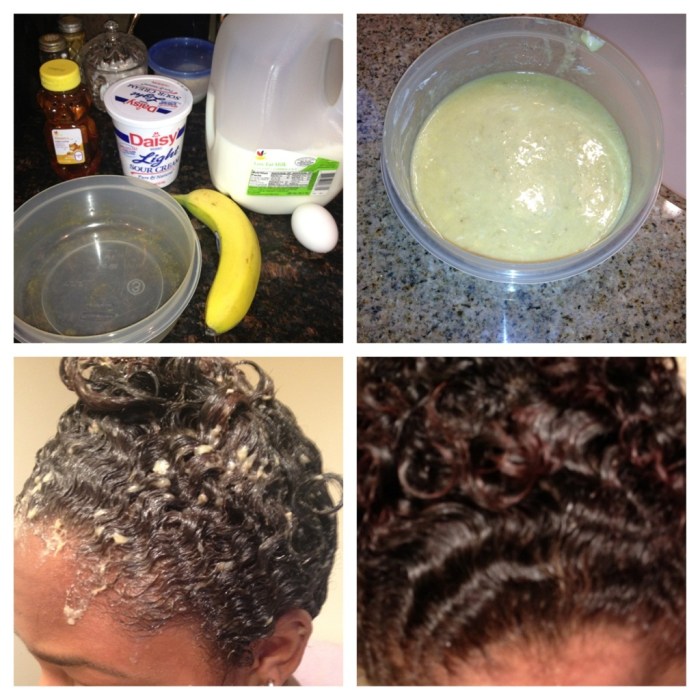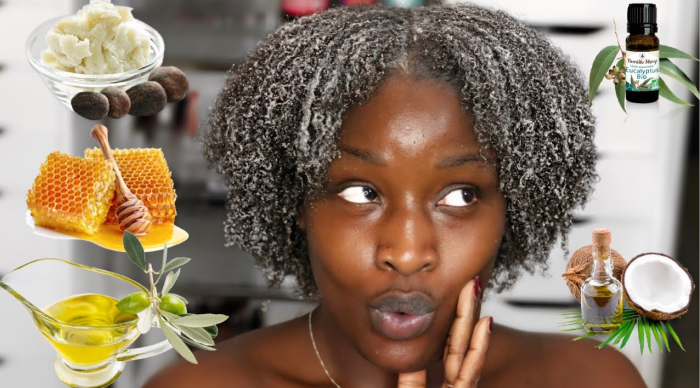DIY curly hair masks are a fantastic way to give your curls the love they deserve. Forget the pricey salon treatments, because with a few simple ingredients from your kitchen, you can create powerful, customized masks that address your specific hair needs. Whether you’re battling dryness, frizz, or breakage, these DIY solutions are packed with natural goodness to leave your curls looking and feeling their best.
This guide delves into the science behind DIY hair masks, exploring how key ingredients like oils, proteins, and humectants work to restore moisture, strengthen strands, and enhance your curls’ natural beauty. You’ll discover a variety of recipes, learn tips for application, and even find alternative commercial options. So, let’s dive in and unlock the secrets to healthy, happy curls.
DIY Hair Mask Ingredients
Nourishing your curls with homemade hair masks is a fantastic way to enhance their health and beauty. These masks use readily available ingredients that are packed with natural goodness, offering a gentle and effective approach to hair care.
Common Household Ingredients for Curly Hair Masks
Here are some common household ingredients that can be used in curly hair masks, along with their benefits:
- Avocado: Avocados are rich in healthy fats, vitamins, and minerals that deeply moisturize and nourish the hair. They can help to improve elasticity and reduce breakage.
- Banana: Bananas are a good source of potassium, which helps to strengthen the hair shaft and prevent breakage. They also contain natural oils that can help to soften and detangle hair.
- Honey: Honey is a natural humectant, meaning it attracts and retains moisture. It can help to hydrate dry hair and add shine. Honey also has antibacterial properties that can help to soothe the scalp.
- Yogurt: Yogurt is a good source of protein, which helps to strengthen hair strands. It also contains lactic acid, which can help to remove product buildup and clarify the scalp.
- Eggs: Eggs are a rich source of protein and biotin, both of which are essential for healthy hair growth. The yolk is particularly beneficial, as it contains lecithin, which helps to condition and soften hair.
Ingredient Combinations for Specific Hair Concerns
The benefits of these ingredients can be combined to address specific hair concerns:
| Hair Concern | Ingredient Combination | Benefits |
|---|---|---|
| Dryness | Avocado, banana, honey | Deeply moisturizes and nourishes hair, adding shine and reducing frizz. |
| Frizz | Avocado, yogurt, honey | Hydrates hair, smooths cuticles, and reduces frizz. |
| Breakage | Banana, egg, yogurt | Strengthens hair strands, improves elasticity, and reduces breakage. |
Maintaining Curly Hair Health: Diy Curly Hair Mask

Curly hair is prone to dryness and breakage, making it essential to maintain its health with proper care. Regular deep conditioning is a vital part of this process, and DIY hair masks can be a wonderful addition to your routine.
The Importance of Regular Deep Conditioning
Deep conditioning helps to replenish moisture, strengthen hair strands, and improve elasticity, all of which are crucial for healthy curly hair. It involves using a rich, creamy product that penetrates the hair shaft and delivers intense hydration. DIY hair masks offer a cost-effective and customizable way to achieve this.
Incorporating DIY Hair Masks into a Hair Care Routine
To effectively incorporate DIY hair masks into your routine, consider these tips:
- Frequency: Aim for deep conditioning once or twice a week.
- Timing: Apply the mask after shampooing and before conditioning. Leave it on for at least 30 minutes, or even overnight for maximum benefit.
- Consistency: Make a habit of deep conditioning regularly to maintain healthy, hydrated curls.
Using the Right Products for Curly Hair
In addition to DIY hair masks, using a good quality conditioner and styling products specifically designed for curly hair is essential.
- Conditioner: Opt for a moisturizing conditioner that detangles easily and provides slip. Look for ingredients like shea butter, coconut oil, or argan oil, which are known for their hydrating properties.
- Styling Products: Choose styling products that define curls, provide hold, and minimize frizz. Look for products with ingredients like glycerin, which helps to attract and retain moisture.
DIY Hair Mask Variations
The basic DIY hair mask recipe is a great starting point, but you can personalize it further by incorporating various ingredients that cater to your specific hair needs and preferences. Adding essential oils, botanical extracts, or clays can enhance the mask’s benefits and provide targeted treatments for your curls.
Essential Oils, Diy curly hair mask
Essential oils can add fragrance and potential benefits to your hair mask. However, it’s crucial to use them sparingly, as they can be potent and might irritate sensitive scalps.
Always dilute essential oils in a carrier oil, such as coconut oil or jojoba oil, before adding them to your hair mask.
- Lavender oil: Known for its calming properties, lavender oil can help soothe an itchy scalp and promote relaxation. It can also contribute to healthy hair growth.
- Tea tree oil: This oil has antibacterial and antifungal properties, making it beneficial for combating scalp issues like dandruff.
- Rosemary oil: Rosemary oil is believed to stimulate blood circulation in the scalp, which may promote hair growth and prevent hair loss.
- Peppermint oil: Peppermint oil can refresh your scalp and provide a cooling sensation. It can also help to stimulate hair follicles.
Botanical Extracts
Botanical extracts offer a range of benefits for curly hair, from adding moisture to enhancing shine.
- Aloe vera: Aloe vera is known for its hydrating and soothing properties. It can help to moisturize dry curls and reduce scalp irritation.
- Green tea: Green tea contains antioxidants that can protect hair from damage caused by environmental factors. It can also promote healthy hair growth.
- Chamomile: Chamomile is known for its calming and soothing properties. It can help to reduce scalp inflammation and soothe irritated skin.
- Henna: Henna can add shine and volume to hair. It can also help to condition and strengthen curls. However, it can temporarily dye hair a reddish-brown color.
Clays
Clays can help to cleanse and detoxify the scalp, remove excess oil, and improve hair texture.
- Bentonite clay: Bentonite clay is known for its ability to absorb impurities and excess oil. It can help to clarify the scalp and improve hair volume.
- Rhassoul clay: Rhassoul clay is gentle on the scalp and can help to remove impurities without stripping away natural oils. It can also add shine and softness to hair.
- Kaolin clay: Kaolin clay is known for its absorbent properties and can help to remove dirt and impurities from the scalp. It can also help to reduce scalp oiliness.
DIY Hair Mask Variations Table
| Variation | Benefits for Curly Hair |
|---|---|
| Lavender oil | Soothes itchy scalp, promotes relaxation, contributes to healthy hair growth |
| Tea tree oil | Combats dandruff, has antibacterial and antifungal properties |
| Rosemary oil | Stimulates blood circulation, promotes hair growth, prevents hair loss |
| Peppermint oil | Refreshes scalp, provides cooling sensation, stimulates hair follicles |
| Aloe vera | Hydrates dry curls, soothes scalp irritation |
| Green tea | Protects hair from damage, promotes healthy hair growth |
| Chamomile | Reduces scalp inflammation, soothes irritated skin |
| Henna | Adds shine and volume, conditions and strengthens curls |
| Bentonite clay | Absorbs impurities and excess oil, clarifies scalp, improves hair volume |
| Rhassoul clay | Removes impurities without stripping away natural oils, adds shine and softness |
| Kaolin clay | Removes dirt and impurities, reduces scalp oiliness |
Safety and Precautions
While DIY hair masks can be a fun and effective way to nourish your curls, it’s essential to prioritize safety. Certain ingredients may cause allergic reactions or irritate sensitive scalps.
Potential Allergens and Sensitivities
It’s crucial to be aware of potential allergens and sensitivities associated with common DIY hair mask ingredients. Some common ingredients to be cautious of include:
- Eggs: A common allergen, especially for those with egg allergies.
- Honey: While generally considered safe, some individuals may be allergic to pollen found in honey.
- Essential Oils: These can be highly potent and may cause skin irritation or allergic reactions.
- Citrus Fruits: The acids in citrus fruits can be irritating to sensitive scalps.
- Nuts: A common allergen, so use caution if you or someone in your household has a nut allergy.
- Dairy Products: Some individuals may experience allergic reactions or sensitivities to dairy products like milk or yogurt.
Patch Testing
Before applying any new hair mask to your entire scalp, it’s recommended to conduct a patch test. This involves applying a small amount of the mask to a discreet area of your skin, such as the inside of your elbow or behind your ear. Observe the area for 24-48 hours for any signs of redness, itching, or irritation. If you experience any adverse reactions, discontinue use and consult a dermatologist.
Thorough Rinsing
Thoroughly rinsing your hair mask is crucial to prevent product buildup. Buildup can weigh down your hair, making it appear dull and lifeless. It can also clog hair follicles, leading to scalp irritation and even hair loss.
The Science Behind DIY Hair Masks

DIY hair masks are not just about fancy ingredients and kitchen concoctions; they are based on scientific principles that target specific needs of curly hair. Understanding how the ingredients work can help you create more effective and personalized hair treatments.
The Science of Ingredients
Understanding the science behind each ingredient can help you make informed choices when creating your DIY hair mask.
- Oils: Oils like coconut oil, olive oil, and argan oil are rich in fatty acids, which act as emollients, helping to seal in moisture and prevent dryness. They also contain antioxidants that protect hair from damage caused by environmental stressors like UV rays and pollution.
- Proteins: Proteins like eggs, yogurt, and gelatin can help strengthen hair strands and improve their elasticity. They can also help to smooth down the hair cuticle, reducing frizz and enhancing shine.
- Humectants: Humectants like honey, aloe vera, and glycerin attract and retain moisture from the air, keeping hair hydrated and supple. They are particularly beneficial for curly hair, which tends to be more prone to dryness and frizz.
| Ingredient | Benefits for Curly Hair |
|---|---|
| Oils (Coconut, Olive, Argan) | Moisturize, seal in moisture, protect from damage |
| Proteins (Eggs, Yogurt, Gelatin) | Strengthen strands, improve elasticity, reduce frizz |
| Humectants (Honey, Aloe Vera, Glycerin) | Attract and retain moisture, prevent dryness and frizz |
By embracing the power of DIY curly hair masks, you’re taking control of your hair care routine and discovering the magic of natural ingredients. Remember, consistency is key. Incorporate these masks into your regular hair care routine, experiment with different variations, and embrace the journey of finding the perfect recipe for your unique curls. With a little creativity and the right ingredients, you can unlock the potential of your curls and achieve a healthy, vibrant mane that you’ll love.
A DIY curly hair mask can be a fun and affordable way to pamper your locks. While you’re getting creative with your hair care, why not channel that energy into a spooky DIY project for Halloween? A DIY Halloween cemetery fence can add a touch of eerie charm to your decorations. Once you’ve finished your spooky fence, you can get back to indulging your curls with a nourishing DIY hair mask.
